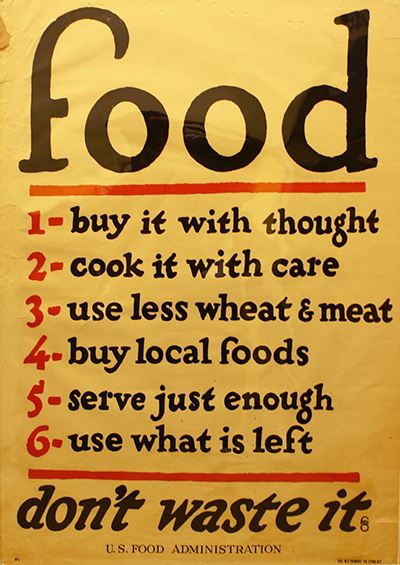How a World War I Rationing Program Could be Cause for Thanks This Holiday Season
 Now that the holidays are in full swing, many will gather together with food, family, and friends to celebrate the season as 2017 closes with a bounty of uncertainty. We can be thankful that many American leaders on state and local levels pledged to do their part for the environment, even as federal support for the Paris Climate Accords has waned. Citizens at home can also play a role in acting for the greater good of the world while celebrating the best of what nature has to offer: plant-based foods. It wouldn’t be the first time Americans came together at their tables for a good cause.
Now that the holidays are in full swing, many will gather together with food, family, and friends to celebrate the season as 2017 closes with a bounty of uncertainty. We can be thankful that many American leaders on state and local levels pledged to do their part for the environment, even as federal support for the Paris Climate Accords has waned. Citizens at home can also play a role in acting for the greater good of the world while celebrating the best of what nature has to offer: plant-based foods. It wouldn’t be the first time Americans came together at their tables for a good cause.
This year marks the 100th anniversary of the Meatless Monday movement. Before it became a hashtag on social media it was a World War I-era food rationing program that asked Americans to express their patriotism by giving up meat one day a week to help feed soldiers and citizens abroad. While its goals have evolved in the last century, the core idea remains as powerful as ever: individual actions can have a broad impact when practiced on a large scale.
National meatless days—originally Tuesday, then switched to Monday by President Roosevelt in World War II—were created during a time of scarcity to conserve resources for troops. Today’s Meatless Monday, revived in 2003 by the Johns Hopkins Center for a Livable Future and former ad-man turned health advocate Sid Lerner, addresses a very different problem: rather than “not enough,” we’re facing the consequences of “too much.” Meat consumption is projected to double by 2050 as more developing countries shift to a Western meat-centric diet. Health experts agree that this upward trend will have serious consequences for the spread of chronic preventable diseases, acceleration of climate change and depletion of precious resources like water, soil, and fossil fuel.
Of particular concern are the effects of high-meat, high-caloric diets on global obesity rates and climate change, both of which could have lasting consequences for future generations. Scientists predict that if trends in meat and dairy intake continue, global mean temperature rise will more than likely exceed 2° C, the level that scientists agree is the point of no return for catastrophic climate change. And as a physician, I’ve seen first-hand how obesity can become a vicious cycle and burden generations to come with poor health outcomes.
The success of Meatless Monday throughout the last century gives us hope that citizens have the power to effect meaningful change, while discovering that reducing meat in their diet doesn’t have to be a sacrifice.
In World War I, millions of hotels, restaurants and housewives replaced meat with more fresh vegetables from Victory gardens grown in communities all over the country. Cookbooks helped people find ways to put satisfying and nutritious meals on the table without meat, and one of the first government-run public health campaigns, with the slogan “Food Will Win the War,” educated Americans about nutrition and how dietary decisions affect their family’s health and the welfare of others.
Today we find vegetarian recipes online and in social media and the whole family takes part in the cooking. Victory gardens are now community gardens and farmers’ markets. Hospitals, restaurants and schools practice Meatless Monday, and the movement has expanded globally with home-grown programs in over 40 countries. And as more chefs and home cooks gain experience preparing delicious meatless meals, they’re more likely to put their skills to use the rest of the week.
Meatless Monday has unified citizens around the world with a simple call-to-action that benefits our personal health, and through collective action, the health of the planet. Join us in taking the Meatless Monday movement into the next century.